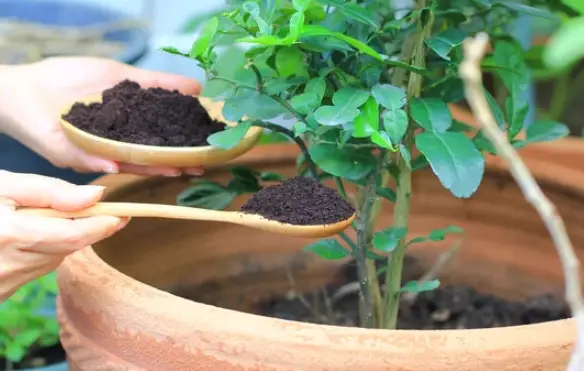Coffee lovers who also enjoy gardening may be pleased to know that their used coffee grounds may have a beneficial effect on plants.
Coffee grounds are high in nitrogen, which is an essential nutrient for plant growth.
Nitrogen is necessary for the development of healthy leaves and stems, and it also helps plants produce chlorophyll, the pigment that gives leaves their green color.
While coffee grounds can be a good source of nitrogen for plants, they should be used with caution.
Coffee grounds are acidic, with a pH of around 6.5, which is lower than the neutral pH of 7.0.
Some plants, such as blueberries, azaleas, and rhododendrons, prefer acidic soil, so coffee grounds may be beneficial for these plants.
However, other plants, such as tomatoes and peppers, prefer soil with a pH closer to neutral, so coffee grounds may not be the best choice for these plants.
Benefits of Using Coffee Grounds for Plants

Does Coffee Grounds Help Plants
Improved Soil Quality
Coffee grounds are an excellent addition to soil as they help to improve soil quality. Coffee grounds are rich in nitrogen, which is essential for plant growth. They also contain other nutrients like phosphorus and potassium, which help to improve soil fertility. When coffee grounds are added to soil, they help to improve soil structure, increase water retention, and promote the growth of beneficial microorganisms.
Natural Fertilizer
Coffee grounds are an excellent source of natural fertilizer. They contain essential nutrients like nitrogen, phosphorus, and potassium, which are essential for plant growth. When coffee grounds are added to soil, they slowly release these nutrients, providing a steady supply of food for plants. Unlike synthetic fertilizers, which can burn plants if applied in excess, coffee grounds are gentle and safe to use.
Pest Control
Coffee grounds can also be used as a natural pest control method. The caffeine in coffee grounds is toxic to insects like slugs and snails, which can damage plants. When coffee grounds are sprinkled around the base of plants, they act as a barrier, preventing pests from reaching the plants. Additionally, coffee grounds can also help to repel other pests like ants and cats.
Overall, coffee grounds are an excellent addition to soil as they help to improve soil quality, provide natural fertilizer, and act as a natural pest control method. However, it’s important to note that coffee grounds should be used in moderation as too much can harm plants. By using coffee grounds correctly, gardeners can enjoy healthier, more vibrant plants.
How to Use Coffee Grounds for Plants

Composting Coffee Grounds
Coffee grounds can be added to a compost pile to help create a rich, nutrient-dense soil. When adding coffee grounds to a compost pile, it is important to mix them with other organic materials, such as leaves or grass clippings, to avoid creating a dense, compacted pile that will not decompose properly.
Direct Application to Soil
Coffee grounds can also be applied directly to soil as a fertilizer. However, it is important to note that coffee grounds are acidic and should only be used on plants that prefer acidic soil, such as blueberries, azaleas, and rhododendrons. When applying coffee grounds directly to soil, it is recommended to mix them with other organic materials, such as leaves or compost, to avoid creating a dense layer that will not allow water to penetrate.
Mixing with Potting Soil
Coffee grounds can also be mixed with potting soil to provide plants with added nutrients. When mixing coffee grounds with potting soil, it is important to use a ratio of one part coffee grounds to two parts potting soil to avoid creating a soil that is too dense and compacted.
Overall, coffee grounds can be a beneficial addition to a plant’s diet when used properly. By composting coffee grounds, applying them directly to soil, or mixing them with potting soil, plants can receive added nutrients that will help them grow strong and healthy.
Considerations When Using Coffee Grounds for Plants
Acidity Levels
Coffee grounds are acidic, with a pH ranging from 4.5 to 6.0. While some plants benefit from acidic soil, others prefer a more neutral or alkaline pH. It is essential to know the acidity requirements of the plants you intend to fertilize with coffee grounds.
Quantity of Coffee Grounds to Use
Using too much coffee grounds can be harmful to plants. Coffee grounds are high in nitrogen, which can burn plants if they are applied in excess. As a general rule, it is recommended to use no more than 20% coffee grounds in a compost pile or garden bed.
Types of Plants That Benefit Most
Coffee grounds are particularly beneficial to acid-loving plants, such as blueberries, azaleas, rhododendrons, and camellias. These plants require acidic soil to thrive, and coffee grounds can help lower the pH levels of the soil. Coffee grounds can also be used on other plants, such as tomatoes, roses, and carrots, but it is essential to monitor the pH levels of the soil to avoid over-acidification.
In summary, using coffee grounds for plants can be beneficial if done correctly. It is essential to consider the acidity levels of the soil, the quantity of coffee grounds to use, and the types of plants that benefit most. By following these considerations, gardeners can safely and effectively use coffee grounds to fertilize their plants.




